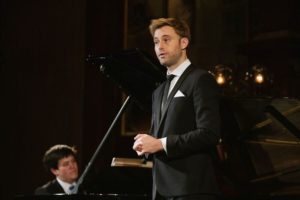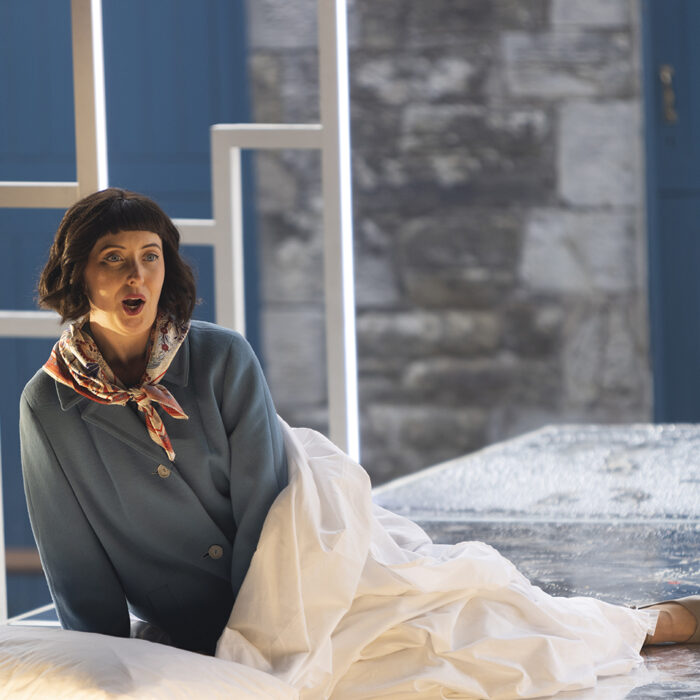
Park Avenue Armory 2018-19 Review: Benjamin Appl
By Francisco SalazarSchubert’s “Winterreise” is perhaps one of the most famous song cycles in the world. Composed of 24 contrasting songs, it is a whirlwind of emotions and a test for any singer. For many, it is the pinnacle of the lieder repertoire and one that poses some of the most difficult challenges for a recitalist.
On Jan. 10, 2019 at the Park Avenue Armory, Benjamin Appl gave the final New York recital of his U.S tour. After two evenings performing Schubert’s “Die Schöne Müllerin” and “Schwanengesang,” the baritone gave a moving and heartbreaking rendition of the “Winterreise.”
Perfect Ambiance
It is often said that recitals are intimate concerts that are best served by small spaces and, in many ways, living room-sized venues. And in the case of the Park Avenue Armery, it fits the atmosphere perfectly for a song cycle like this.
When Appl stepped on stage with James Baillieu, the room fell silent and lights turned off. It was pitch black. The mood was set and as the piano started playing and as the opening phrases rang through the hall, the lights started to slowly turn on. In came Appl’s gorgeous and elegant voice with a suave and tender tone. The opening piece “Gute Nacht” repeat the same melodies throughout the stanzas and Appl caressed each phrase spinning it with varying color. Each repetition of the melody obtaining a different timbre and he organically changed dynamics with ease. He began the piece in a tender mezzo forte crescendoing to a forte as it reached its climax before returning to the mezzo forte from the beginning.
That was on display throughout the evening as he could easily go from a fortissimo to a piano sound and then suddenly float his tone into a delicate pianissimo that sounded almost as if he was singing in falsetto. This was particularly present in sublime interpretations of “Einsamkeit” and “Der Greise Kopf.” The final lines died down with Appl’s sound never losing that elegance or purity.
Emotional Investment
But what was even more striking was how emotionally invested Appl was in each piece. Regardless of the constant flipping of pages from the audience’s program, his eyes were always concentrated on the the emotional journey the song cycle requires. His facial expressions, particularly his eyes, changed with each piece; in one moment he was haunted by something; in another there was joy followed by sadness and pure desolation. There was a glimpse of tear coming from his eye in the final “Der Leiermann,” which only emphasized how emotionally invested he had been throughout the evening.
As the recital came to end the lights came down slowly to fill the room once again with pure darkness. The audience fell silent taking in the mix of emotions they had just heard. And when the lights went back on it exploded into a rapture of applause.
Highlights
Throughout the evening Appl had many potent moments that stood out as highlights. Among these were his interpretation of “Fruhlingstraum.” The piece saw Appl begin with a bright and playful tone that evoked the dream-like qualities in the piece. The playfulness was emphasized as he recited each line and emphasized certain consonants. But in the second stanza his voice took on a more frantic, grainier sound. These emotional and aural shifts were felt throughout the entire six stanza piece, with the final phrases sung with delicate lightness.
But the most moving moments of the evening were the final four pieces. While there were so many riches throughout the evening, these four had an arc that really saw Appl at the height of his powers.
“Das Wirtshaus” was filled with nostalgia as each phrase was sung with a hushed timbre. Appl floated the line while Baillieu’s piano was pure tenderness, almost as if he were playing a lullaby. But that nostalgic quality turned to sadness as he repeated “Nun weiter denn, nur eiter mein treer Wanderstab” growing to the forte and emphasizing the consonants with even more power.
The subsequent piece “Mut!” saw Appl’s baritone regain the vigor and full sound. His eyes opened wide and, together with Baillieu, they gave the short piece a heroic quality that was a complete contrast from the predecessor.
“Die Nebensonnen” saw a more reflective quality with Appl holding onto the notes throughout numerous phrases. He used his decrescendos effectively, moving from a forte to a piano in the second stanza. In the final stanza Appl managed to use fil di voce technique, floating the sound effectively before dying down and letting Baillieu take over to end the piece.
The final “Der Leiermann” saw a desolate characterization. Each phrase was cut short, death permeating every moment. That was coupled by Baillieu staggered and mysterious phrasing. Appl never rose above a mezzo forte and never used a full sound, furthering this loss of strength. As concluded the work, his sound continually faded in volume, dying down with the piano. That final fade was given a tragic quality as Appl said the final questioning words “deine leier dreh’n?”
Pianist Baillieu performed with veritable elegance, working precisely in shaping every phrase with Appl. He never missed a dynamic or tempo shift, but what was most powerful was the overall cohesion in the two matching musical colors. In pieces like “Der Leiermann” it was as if they were having a conversation, questioning and answering each other.
My only qualms with Baillieu was his constant emphasis on holding onto the final note of every piece. While I understood that he wanted to have the note fade out, it made for repetitive phrasing that after a while took away from the spontaneity of each piece’s conclusions.
However, this was an evening of pure musicality and the exploration of human sentiments. Benjamin Appl demonstrated that he is a consummate artist. For anyone who hadn’t heard the baritone before, this was a huge discovery. He is one to keep an eye out for in years to come.


